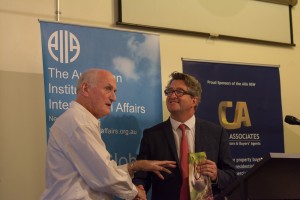Domesticating the Paris Climate Agreement – where to now for Australia?
On Tuesday 23 February, our guest at Glover Cottages was John Connor, CEO of The Climate Institute since 2007. John is a leading analyst and commentator on Australia’s domestic and international carbon policy. He sits on numerous government and business advisory panels, including the NSW government’s Climate Council.
According to John, six years ago, the Copenhagen Climate Change Conference, the tenth since Berlin in 1995, lost direction. It was disorganised, riven by factional infighting. Commercial sponsors like Coca Cola advertised ‘owning’ it. Attempts were made by advocacy groups to set numbers on national climate emission reductions by various countries, but these failed. China and the United States struggled for political dominance. But much was learned, including the realisation that individual countries would themselves have to come up with carbon emission reductions that they felt they could live with. Fast forward to the Paris Conference of 2015, where the focus was on mechanisms to establish reductions. A sense of national interest and involvement was detectable, although this by itself will not necessarily keep the process alive. The burning issue, said John, was whether the major emitters could work together to contain emissions in future to keep global temperature increases to a maximum level of 1.5 degrees Celsius. Small island states pricked the conscience of major emitters by describing their parlous state as a result of sea level rises creating havoc with crops through salinization and flooding of arable lands. They challenged bigger states with vague objectives. There is a growing recognition that emissions must be curbed around the globe.
In the business sector, John said the administrators of super funds were beginning to avoid investing in industries emitting carbon dioxide. The Paris conference noted that there was less concerted business lobbying and a decline in investment in fossil fuels. Zero emissions used to be a concept hard to understand, but it is now part of the international language, and catastrophe may yet be avoided. Biomass, carbon capture, carbon storage were terms well understood, and technologies were developing to realise them.
As for Australia? We have to stop emissions from growing and develop a carbon-free budget. We have 8 to 9 billion tonnes of coal still in the ground. That’s where it must remain. Apart from counterproductive decisions like closing down the Climate division in CSIRO and proceeding with the Adani Carmichael coal mine in Central Queensland, climate sensitive decisions may be coming. Surprisingly, Foreign Minister Julie Bishop has embraced the 1.5degree upper limit to global temperatures. And we have an oversupply of coal-fired power stations. It makes increasing sense to close them down. John confessed to being an optimist by nature. The glass was indeed half full.
Report prepared by Richard Broinowski
